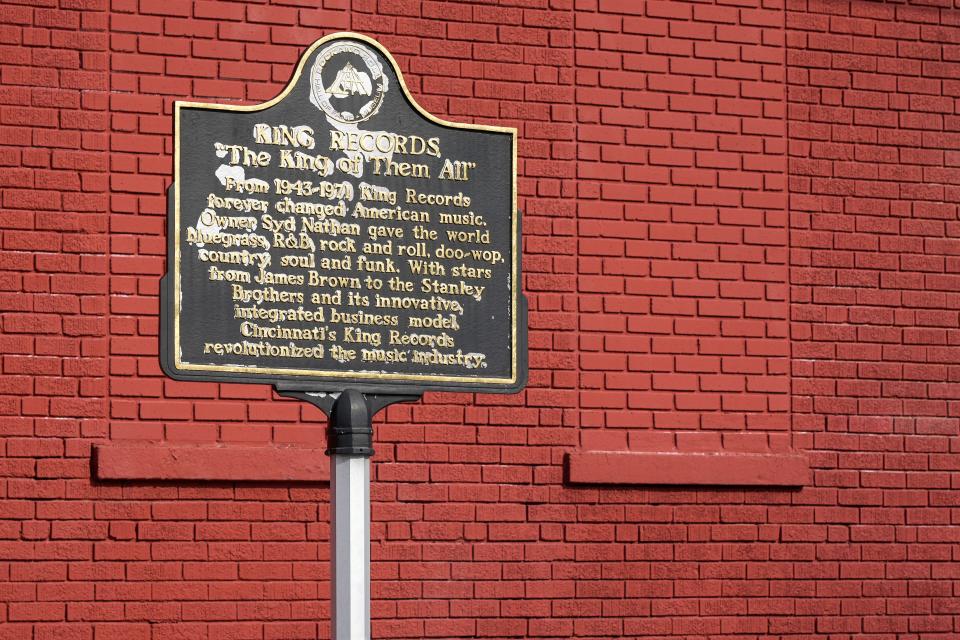King Records launched James Brown. A nonprofit seeks city money to preserve it

Cincinnati’s King Records is a place where rock history, civil rights history and Cincinnati history intersect at the corner of a dead-end street just north of Downtown.
It's the place where the rock 'n' roll standard “Good Rockin' Tonight” first became a hit in the late 1940s. It's where hillbilly boogie ? soon to morph into rock 'n' roll ? was born in 1946. It's where “The Twist” was written by a King artist. It's where James Brown became, well, James Brown.
Eight years ago, then-Mayor John Cranley knew how important that history was to Cincinnati's story and hatched a plan to save the crumbling building. He wanted to turn it into a museum and recording studio.
It's turned out to be expensive and time-consuming. But nobody is giving up. A nonprofit group, King Records Legacy Foundation, is working to raise the estimated $15 to $20 million for the project, which now includes an event space and possibly a cafe.
The foundation is asking Cincinnati City Council for $410,000 to help jump-start a fundraising campaign. Council is set to consider that March 4. The money would come from $1 million in capital money meant for building improvements a previous Cincinnati City Council approved for the project in 2021.
Vice Mayor Jan-Michele Lemon Kearney said during a Feb. 7 Cincinnati City Council meeting that she's regularly asked about what's going to happen with King Records and whether the project will ever get going.
She said she wants to be able to say yes.
"This community, this city are depending on King Records to move forward," Kearney said. "It has been delayed too long. It is time to get going. Let them make King Records a success."
So what happened to the plan to save King Records?

The King Records legacy
At its peak, King was the nation’s sixth-largest record company, according to the Ohio History Service Corps. In all, from 1943 to 1971, King artists racked up 461 hits. Of those, 32 went to No. 1 on the country, pop and R&B charts. A King secondary label launched the career of James Brown.
King Records closed in 1971, three years after the death of founder Syd Nathan.
When Cranley was elected in 2013, the King Records building was crumbling and empty. It was owned by a manufacturing company that planned to demolish it.
Cranley wanted to preserve it and the history it represented.

John Cranley's plan to save King Records
In October 2015, the city designated the building where King Records once operated a historic landmark, declaring it a place to be protected, preserved and restored.
That doesn't mean it can't be demolished. But in this case, with the city as the owner of the property and the nonprofit foundation formed to bring the building back to life, nobody thinks that would happen.
Cranley had hoped to have the city pay for renovation and operating costs – around $2 million he thought back then – as part of the 2015 parks levy. The levy failed, but Cranley still championed the project.
The city worked with the building's owners to take control of the King Records portion of the property in 2018. That same year, the city approved the formation of the King Records Legacy Foundation, which has been working to revitalize the site.
The foundation is made up of business leaders and King Records artists, including Bootsy Collins. It's led by Kent Butts, the son of Otis Williams, who recorded under the King label with his band The Charms.
The foundation, Butts said, was "bred to be the stewards to take care of the property.
"Most of these artists have passed away," Butts said. "Somebody needs to stand up for these artists."
The first phase would be to raise $2 million to $3 million to stabilize the building, which would allow the foundation to bring fundraisers inside to share their vision.

"We can no longer develop the building in our spare time," said Steve Goodin, a former Cincinnati City councilman and the foundation's treasurer. "This is a city asset that we are developing. We have been working on this on our time and our own dime."
But to raise this kind of money, Goodin said, "We are going to need some fundraising help."
Goodin said there is no ultimatum, just hope that the city will spend money the previous council set aside. The foundation, he said, would still work to raise the money on its own.
He said the spending plan originally sent to City Council could be scaled back before the plan goes back to council committee. The King Records Legacy Foundation worked with University of Cincinnati students to come up with eight designs of what King Records could become. Goodin hopes to incorporate the ideas into a final rendering over the next year.
King Records Legacy Foundation Board member Andrew DeWitt, founder and executive chairman of Dewey's Pizza, told council members he was "confident this project will speak to this community and will be funded."
He said there already have been donations from some of Cincinnati's wealthiest business and development leaders.
"There is a path absolutely to sustainability for this project," DeWitt said.
In 2022 the site was added to the National Register of Historic Places.
Still, it will take more than historic designation and city ownership to get the project done.
What's next?
The King Records Legacy Foundation is launching a fundraising campaign. Members say the $410,000 would get them started.
The money would go toward paying a company $150,000 to lead a yearlong national fundraising campaign, pay for marketing materials, pay a lobbying firm $42,000 for a year to pursue state and federal grants and pay to hire a full-time executive director/project manager for $144,000 the first year.
City Council was supposed to vote on the spending Feb. 7. Kearney and council members Scotty Johnson and Meeka Owens were for the idea. But council members Reggie Harris, Seth Walsh, Jeff Cramerding, Anna Albi and Mark Jeffreys sent the plan back to Budget and Finance Committee for further discussion.
They want to discuss exactly how the money would be spent.
Today, at the site, a bronze plaque reads “The King of Them All.” It mentions the studio’s biggest stars and tells anyone who bothers to turn down the small quiet side street that sits above Interstate 71 that “Cincinnati’s King Records revolutionized the music industry.”
This article originally appeared on Cincinnati Enquirer: King Records in Ohio launched James Brown. Will this city preserve it?
